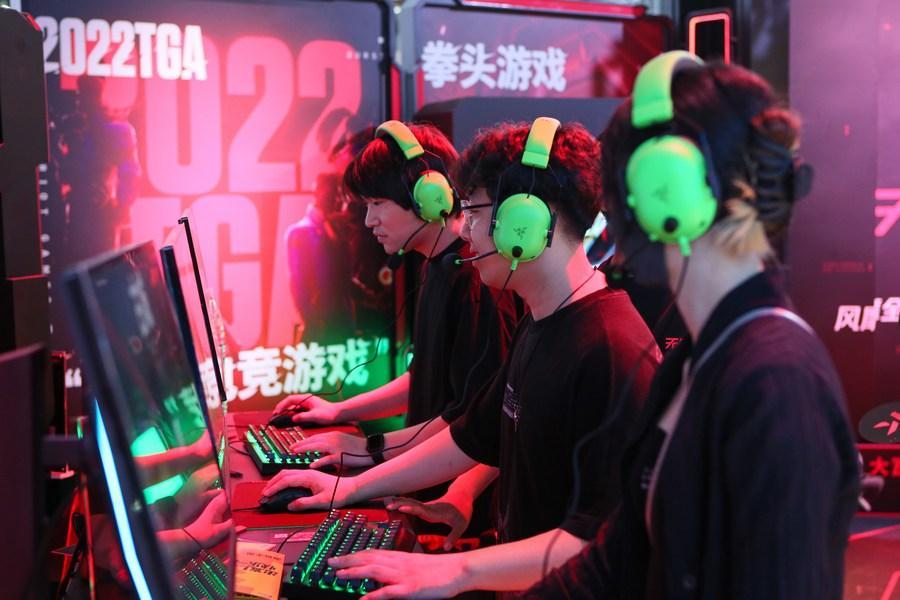Esports: From the Asian Games to the Olympics?
- By Mitchell Blatt
 0 Comment(s)
0 Comment(s) Print
Print E-mail China.org.cn, August 18, 2023
E-mail China.org.cn, August 18, 2023

Visitors experience a game during the ChinaJoy 2023 in Shanghai on July 28, 2023. [Photo/Xinhua]
This year has been a big one for esports. In June, Singapore hosted the first-ever Olympic Esports Series. The event was a step towards possibly winning acceptance as an Olympic event. But what is even bigger for esports is the upcoming 2022 Asian Games in Hangzhou, China, which is slated to start on September 23, 2023.
The Asian Games in Hangzhou will be the first major competition to feature the most popular esports games, including League of Legends, PUBG Mobile, FIFA, and Street Fighter V. The breadth of the games up for competition includes battle royale, real-time strategy, battle arena, traditional sports, and beat 'em up games. A nice variety of gaming styles is represented, but it is missing a card-collecting game after Hearthstone was pulled when the game makers couldn't reach an agreement.
By contrast, the Olympic Esports Series excluded all the most popular games due to concerns about on-screen "violence." Instead, they used virtual versions of real-life Olympic sports. At the last minute, they added a sanitized version of Fortnite in which competitors' on-screen characters shot at targets rather than each other. That doesn't make sense.
The video games on display at the Asian Games are the actual games that esports competitors really play and viewers really watch. You cannot call something "esports" that doesn't include real esports. Some might say "esports" should not even be called "sports," but I will put aside that argument for a later day.
The point is that esports participants have created their own culture, and the Asian Games is respecting that culture as it organizes and promotes its esports events.
PUBG: Battlegrounds is the most popular battle royale game on Steam. At any given time, close to 200,000 people are simultaneously playing PUBG online. The mobile version of the game was created by Tencent, and it is the most popular battle royale game on mobile phones, with over 1 billion online downloads.
In the game, a hundred or so competitors are parachuted onto an island, where they use weapons and resources to eliminate all of their opponents until they are the last standing.
League of Legends is one of the most well-known and most popular games for fun and competitive gaming. It is a team-based battle area game, while PUBG is every-fighter-to-themselves. I saw many cybercafes full of youths playing LoL during my time in China.
The only game of the above I have played myself is Street Fighter. It is a classic. The second edition, released in 1991, came out before the time I had one of my first video game consoles, a Sega, as a child, and I spent hours jumping around as Blanka.
Street Fighter II was the best-selling arcade game of all time. It put iconic characters, like Chun Li, into the world's consciousness, and it created the standards for all future one-on-one fighting games. The version in the Asian Games is Street Fighter V, which was released in 2016.
All the different games in similar genres and the many versions of games raise another question that would make it difficult for esports to make it into the Olympics. It's unlike athletic sports like baseball or ping pong, where there is one version of the game, and anyone can pick up a ping pong paddle and play. Once you learn ping pong, you don't need to learn different versions of ping pong for different platforms.
There might be similar genres and concepts in esports – the battle royale, the team battle, the beat 'em up game, etc. PUBG and Fortnite, for example, have very similar concepts. Both are battle royales where every player gets dispatched somewhat randomly. But the gameplay is different enough that players who specialize in one would not be as competitive in the other game when matched up against experts.
So there would be arguments – not just between rival game producers but also rival players and countries that specialize in one or the other – over which games to choose as the featured esports events. In the U.S., Fortnite is more popular, but in China and Asia, PUBG is more popular.
In the end, I don't know if esports will ever be official Olympic sports. There are already a lot of high-stakes tournaments and championships being held around the world that are generating close to $2 billion in global revenue. They don't need the Olympics to recognize them.
Mitchell Blatt is a columnist with China.org.cn. For more information please visit:
http://www.china.org.cn/opinion/MitchellBlatt.htm
Opinion articles reflect the views of their authors, not necessarily those of China.org.cn.






Go to Forum >>0 Comment(s)